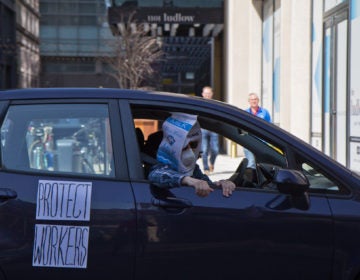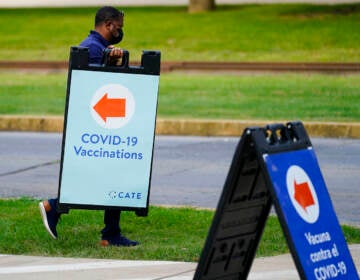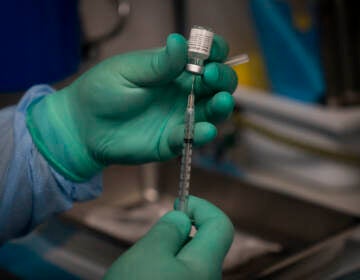Coronavirus update: Wolf extends stay-at-home orders for ‘red’ counties through June 4
Gov. Tom Wolf and Pennsylvania Health Secretary Rachel Levine have extended the order for the state’s 43 counties in the “red” phase through June 4.
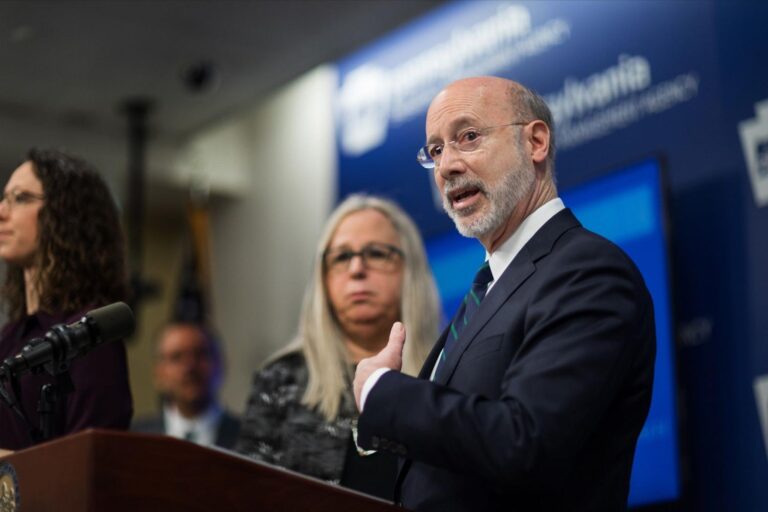
(Natalie Kolb/Commonwealth Media Services)
Updated at 8:40 p.m.
–
Are you on the front lines of the coronavirus? Help us report on the pandemic.
Pennsylvania has 1,156 new positive COVID-19 cases as of Thursday, a 2.1 increase in total cases over the previous day. Over the past seven days, the commonwealth has recorded an increase of 8,022 cases, or 16.7 percent.
The state has recorded 55,606 cases out of more than 262,788 tested.
Statewide, Pennsylvania has reported 310 new deaths as of Thursday. The Department of Health says this is the result of “continued work to reconcile data from various sources,” and that the deaths have occurred “over the past several weeks.”
Philadelphia had reported 186 new positives as of Wednesday. The current seven-day average is 453 per day, slightly less than a week ago. The city has recorded 16,697 cases so far, and 816 deaths.
Wolf extends stay-at-home orders for ‘red’ counties through June 4
Partisan tension erupts at Montgomery County briefing
At Montgomery County’s daily coronavirus press conference on Thursday, it quickly became clear that partisan tension has been simmering among the county commissioners over business closures and social distancing measures.
The boiling point, apparently, was flags.
As has become customary for the county, Chief Commissioner Val Arkoosh kicked off the briefing with an update on new COVID-19 cases and deaths. The county has seen 105 new cases in the past day, for a total of 4,839. Forty of the new cases were people living in long-term care facilities. There were also 14 new deaths, for a total of 393 since the pandemic began.
But after Arkoosh, a Democrat, had finished, Joseph Gale — the sole Republican on the three-person board of commissioners — took the podium and said he was “blown away” that state and county officials haven’t done more to ease stay-at-home orders and telegraph optimism to residents.
Specifically, Gale’s gripe was about Montgomery County’s decision to delay its custom of handing out free American flags to be placed on veterans’ graves ahead of Memorial Day. Arkoosh and Commissioner Kenneth Lawrence, also a Democrat, have said they opted to delay flag distribution over fears of spreading coronavirus, but that flags would still be available before the Fourth of July.
Gale said he’d protested that he “has faith” that people can hand flags out safely, but was outvoted.
And then, in a long address to reporters, he said the “outrageous, un-American, disrespectful” flag issue is symbolic of larger problems in the county and the state’s coronavirus response.
Noting that 83 percent of Montgomery’s coronavirus deaths have been in residents of long-term care facilities, Gale said while those residents should still get special care, he believes it is time to ease lockdowns on everyone else.
“What I’m disappointed in with this administration is the failure to recognize that and move forward,” he said. “We’re at a stage now where we must move forward, we must begin the process of reopening Montgomery County, we must begin the process of reopening the commonwealth of Pennsylvania.”
He specifically criticized his fellow county officials for not being more cheerful at their daily press briefings about the spread of the coronavirus — telling them that “every day I stand here, it’s all doom and gloom … we have to provide optimism, we have an obligation to do so as a county leader and I don’t see that happening.”
Apart from optimism, Gale offered few specific proposals. State officials, he noted, are in charge of setting the timeline for businesses to reopen and stay-at-home orders to ease.
So far, Montgomery County — one of the counties hardest-hit by coronavirus — is still firmly within the “red” category that is deemed most critical in Governor Tom Wolf’s three-tiered reopening plan.
Gale did say he likes the approach taken by fellow hard-hit Philadelphia collar counties, Bucks and Delaware, which have both requested that the state allow them to count coronavirus cases in nursing homes as separate from their total caseloads.
State health officials have indicated they won’t grant that request.
After Gale was finished speaking, Arkoosh retook the podium and appeared to be trying to make peace.
“I know this is really hard,” she said. “Everybody is exhausted, We’ve asked so much of you over these last several weeks.”
But, she added, she doesn’t think it’s time to change course yet.
“These are the steps that we are taking in order to be able to relax the guidelines when it is appropriate to do so, and start to move back to a more normal sort of state,” she said. “Wishing is not going to make it so.”
Gov. Wolf and Attorney General Shapiro announce foreclosure, eviction protections
Through at least July 10, a newly-signed executive order from Governor Tom Wolf will prevent Pennsylvanians from being foreclosed upon or evicted.
The order is an effort to extend the effects of a rule the state Supreme Court entered early in the pandemic, which closed court eviction proceedings — and functionally, evictions themselves — through May 11.
Wolf and Attorney General Josh Shapiro, who joined the announcement in support of Wolf, noted that homeowners and renters are, in most cases, required to keep making their monthly payments, and will eventually have to provide back pay if they’re temporarily unable.
“The governor and I have been very clear that, look, rent is still due,” Shapiro said. “And landlords will work with you if you need some type do of relief. The key here is making sure that an eviction cannot happen, not only during this crisis, but in the weeks and months thereafter.”
Shapiro also urged landlords to seek federal aid if their rent income dries up. He added, landlords cannot retaliate against non-paying tenants — for instance, by turning off utilities.
Wolf, in turn, said that tenants should “sit down” with their landlords and work out an arrangement if they are unable to pay rent.
The administration had been under mounting pressure from renters and homeowners to come up with a longer-term solution to prevent housing loss during the nation’s sudden economic crisis. To date, more than 1.7 million Pennsylvanians have filed for unemployment, and many of those job losses are likely to be permanent.
Some have expressed a desire to see relief efforts go further. A group of Philadelphia renters, for instance, have spent roughly the last month organizing for a possible rent strike.
The city had already put evictions on hold through May 29, and City Council is considering a package of measures aimed at preventing a potential avalanche of evictions when pandemic mitigation efforts eventually end.
Wolf and Shapiro said they’re also working with the PA Housing Finance Agency, which has temporarily stopped foreclosures and evictions, and is waiving late fees to homeowners who have PHFA mortgages and have been hurt financially by the coronavirus pandemic.
Antibody tests still a no-go until further research, Farley says
While coronavirus antibody tests have been developed in other parts of the region, Health Commissioner Tom Farley said the city still isn’t recommending them as an approved metric for gauging coronavirus immunity. “There’s still not enough research out there about what a high antibody level means … someone might believe that they’re immune when they’re in fact not immune,” he said Thursday.
Farley also addressed the possibility of undercounted coronavirus deaths, explaining that not all city deaths (for example, overdose deaths) were being tested for COVID-19. “We’re probably undercounting deaths, I don’t know how big [that] is … when we look back on this, we will probably count more deaths related to this epidemic than we are now.”
Mayor Jim Kenney has said he’s aware of “open up Philly” demonstrations scheduled for this Friday, but didn’t express concern about either the protests or possible counter-protests. “Whatever protests we have, we’ll treat with First Amendment respect,” he said, “as long as people are expressing their views in a reasonable way and not damaging property or hurting anybody else. And I don’t expect that to happen.”
As weather warms up, avoid heading to Jersey Shore, Levine says
There are currently no travel restrictions preventing Pennsylvanians from heading to the Jersey Shore as the weather gets nicer, but Pennsylvania Health Secretary Rachel Levine is advising residents not to visit the Garden State’s beach towns.
“I know it’s tempting given the warm weather that will hopefully be coming soon, but going into New Jersey can have risks because New Jersey has had a very high incidence of COVID-19,” Levine said during her Thursday press briefing. “And if you go to the shore, I bet you other people will go to the shore, and then it will be almost impossible to practice social distancing.”
Some Jersey Shore municipalities have announced plans for partial reopenings, starting as early as this Friday.
Avalon, Stone Harbor and Ventnor are allowing for walking, running, fishing and surfing on its beaches. Swimming is currently off limits, along with putting down a blanket or chair.
N.J. Gov. Phil Murphy said this week it’s too early to tell if the state will reopen by Memorial Day weekend, the state’s first big weekend for summer at the Jersey Shore.
Visiting mom for Mother’s Day? Only if you’re in one of Pa.’s ‘yellow zones’
Levine added during her Thursday press briefing that seeing mom for Mother’s Day on Sunday would be OK as long as you and mom live in one of Pennsylvania’s 24 counties set to shift into the yellow phase on Friday.
If you still live in Pennsylvania’s red zone, Levine recommends celebrating the holiday virtually.
“The safest thing you can do for yourself, the safest thing you can do for your mother, and your family and your community is to do that visit virtually,” Levine said.
Even for those in Pennsylvania’s yellow counties, she said visits in long-term care facilities and nursing homes are still prohibited due to the severe risk of COVID-19 spread.
Pa. gig workers can finish applying for federal assistance
Pennsylvania gig workers can finally finish applying for a new federally-mandated assistance program, announced the Department of Labor and Industry Monday.
More than 174,000 state residents have started the process since the commonwealth launched the first step on April 18, and will now be able to file weekly claims to receive between $195 and $572 dollars a week. Part-time employees, gig workers and others who work on short contracts are often in a more precarious financial situation to begin with are barred from accessing traditional assistance.
Those applications will be retroactive to January 27, 2020, or the first week that work was lost. Applicants should also automatically receive an additional $600 per week in special federal assistance through July 25.
“Your very first payment — whether it’s the backdated lump sum payment or a regular weekly payment — will arrive within one week or less after you file your first certification,” according to state officials. For each subsequent week without work, applicants must file a new claim every sunday.
The program, called Pandemic Unemployment Assistance, is the result of a federal aid package aiming to ease the economic pain caused by the coronavirus lockdown orders. Pennsylvania’s traditional unemployment system has been hit with more than 1.7 million new initial claims since the pandemic began.
A guide to filling out the PUA paperwork is here.
Free Uber rides for people seeking domestic violence services
On Thursday, Uber announced it is donating 1,000 free rides to the Pennsylvania Coalition Against Domestic Violence.
Through the collaboration, Uber and PCADV say they’ll be able to coordinate transportation between a domestic violence victim’s home and a safe location — with workers in the program able to send victims a code for a free ride.
The idea, program coordinators said in a statement, is that the rides will provide “additional support” to people seeking domestic violence services during a time when violent incidents in homes are on the rise.
“We’re grateful for Uber’s commitment to assisting survivors of intimate partner violence, especially during this extraordinary time,” PCADV head Susan Higginbotham said in a press release. “Intimate partner violence is a public health crisis, and now with the COVID-19 pandemic, helping survivors access services and safe housing is even more critical.”
Pa. Treasurer urges federal officials not to try and fix budget holes with austerity
In a virtual conference hosted by the nonprofit public policy think tank the Volcker Alliance, Pennsylvania Treasurer Joe Torsella — who was joined by former GOP Tennessee Governor Bill Haslam, among others — made a case for Pennsylvania and the federal government maintaining relatively stable funding levels despite looming revenue shortfalls caused by coronavirus.
He was up-front about the financial challenges.
“There are these extraordinary, unprecedented pressures on almost every aspect of state finances,” Torsella, a Democrat, said. “There is and has been a dramatic decline in revenues … the projections for the remainder of the year are, by decent forecasters, somewhere around and probably north of $4 billion.”
Torsella also predicted that the state’s investment performance for the foreseeable future would not be “a happy story.”
For context, the entire state budget is around $34 billion.
Torsella said while states can take limited action to try to right the fiscal ship, he believes a lot of the responsibility will have to lie with the federal government.
He’s happy with some of Congress and the president’s initial actions. The CARES Act — from which Pennsylvania received about $4 billion — has been, he said, “a huge benefit in terms of dealing with liquidity issues.”
But, he added, it doesn’t cover the cost of lost revenue, which he believes will be absolutely necessary if states are going to recover quickly.
He’s looking at federal and state budgeting after the 2008 Great Recession for guidance. And what he has concluded is that insufficient federal aid led to deep cuts in state budgets, which probably impeded an economic turnaround.
“We rescued the markets but we did not do enough to rescue the states,” he said. “Not having done that, the austerity that they needed to resort to impeded our recovery by years.”
Thus far, federal lawmakers — particularly in the GOP-controlled Senate — have been hesitant to commit to any major bailouts.
Majority Leader Mitch McConnel (R-Ky.) drew criticism last month for suggesting on a radio show that states might be better-served in taking “the bankruptcy route.”
“My guess,” he continued, “is their first choice would be for the federal government to borrow money from future generations to send it down to them now so they don’t have to do that. That’s not something I’m going to be in favor of.”
However, he said later that there would likely be some form of new funding for state and local governments coming from the federal government in the future.
Bucks commissioners elaborate on letter to Gov. regarding nursing home metrics
Earlier this week, Bucks County officials sent a letter to Gov. Tom Wolf’s administration calling for more “flexibility” in managing local restoration.
The commissioners say that community spread in the suburban county has consistently dropped, now to approximately less than 10% of daily cases. They believe that as widespread testing increases in the county’s long-term care facilities, they will ultimately see an uptick in cases.
In the letter, the officials call for a decrease in “specific reliance” on the rate of COVID-19 per capita as a major factor in reopening decisions.
“We believe a regional or even county-wide assessment goal of an average of less than 50 cases per 100,000 individuals over the course of 14 days will have a detrimental effect on our effort to maintain Bucks County’s infrastructure of business, tourism and community support,” the letter reads.
During Thursday’s press briefing, Bucks County Commissioner Bob Harvie said the data collection in Pennsylvania has become “somewhat of a horse race.”
He said through the county’s rigorous contact tracing efforts, they may have more specific information about where cases are in Bucks County, that they can then share with the Wolf administration as they decide when regions of the state can start moving toward reopening efforts.
“The issue was really about sharing what we’re learning from this data with the governor and making sure that they’re aware, here’s a very large county in this commonwealth, that’s obviously impacted heavily by this virus that is collecting data at a rate unlike many other counties our size,” Harvie said. “What’s the best way moving forward to incorporate this data into our decision-making process?”
The commissioners said they have not yet received a response from the Wolf administration regarding their request.
Bucks County currently has 3,599 cases and 288 deaths from the coronavirus.
Free trees for Philly residents this month
How does a city parks department get trees planted during a pandemic?
If you’re Philly Parks and Recreation, the answer is: carefully.
After canceling a string of spring tree giveaways in its Community Yard Tree Giveaway Program, the department’s eight-year-old TreePhilly initiative is resuming operations this month, with several events planned for late May when city residents will be able to attend either a “no-contact” event to pick trees up in their cars, or, if they’re part of a high-risk population or don’t have a car, set up a door-to-door tree delivery.
Pickups will be on May 23 and 24, and the Parks Department says it will strictly limit the numbers of people allowed to pick up trees at a time, staff will socially distance, and residents will be asked to load trees into their own cars. Deliveries will go out from May 25 to 29.
Trees are free, but there are a few rules for planting. People who register to receive trees have to be city residents, and the trees have to be put in the ground on private property.
Registration is open on TreePhilly’s website through May 17.
Center City SIPS canceled for summer 2020
Philly’s annual summer happy hour, which usually sees over 80 bars and restaurants in Center City offer far cheaper-than-usual drinks and appetizers from June to the end of August, is going on coronavirus hiatus.
The Center City District SIPS Twitter account announced the news Thursday, saying the decision had been made in the name of “public health and safety.”
But organizers are still urging Philadelphians to support those bars and restaurants, even if they can’t get discounted drinks in person. The SIPS website has a list of all the participating businesses, many of which are still open — at least partially — for takeout and delivery.
WHYY’s Laura Benshoff and Emily Scott contributed reporting.
WHYY is your source for fact-based, in-depth journalism and information. As a nonprofit organization, we rely on financial support from readers like you. Please give today.



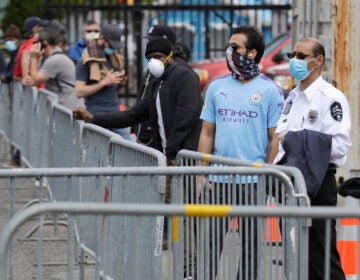
![CoronavirusPandemic_1024x512[1]](https://whyy.org/wp-content/uploads/2020/03/CoronavirusPandemic_1024x5121-300x150.jpg)
